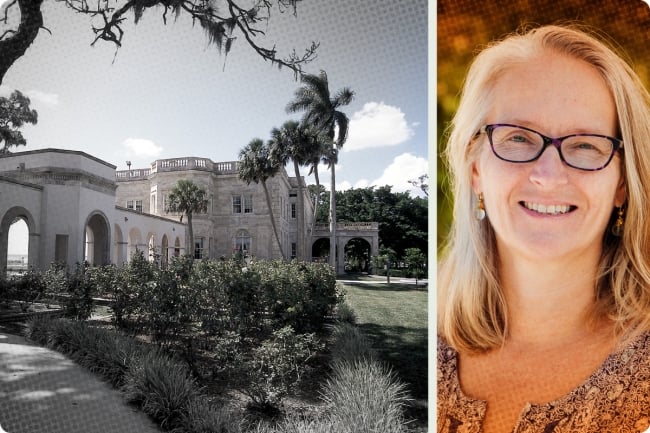You have /5 articles left.
Sign up for a free account or log in.

Amy Reid, New College of Florida’s faculty chair and a Board of Trustees member, has taken leave from the institution to work for a free-expression nonprofit.
Photo illustration by Justin Morrison/Inside Higher Ed | Independent Picture Service/Universal Images Group/Getty Images | New College of Florida
This past week provided plenty of reminders that Florida governor Ron DeSantis’s conservative overhaul of public higher education in his state still isn’t over—especially not at New College of Florida, where the Republican stacked the Board of Trustees with conservative members back in January 2023.
The Sarasota Herald-Tribune reported Thursday that New College was throwing out books that had been housed in its now-shuttered Gender and Diversity Center. “Putting gender studies books in the garbage? Great job, @NewCollegeofFL,” DeSantis press secretary Jeremy Redfern posted approvingly on X, alongside an applause emoji.
Chris Rufo—one of DeSantis’s New College board appointees and the activist who helped fuel the right’s crusades against critical race theory and diversity, equity and inclusion—posted to X that “we abolished the gender studies program. Now we’re throwing out the trash.” He also shared a photo of Marie Kondo, the “tidying expert” who urges homeowners to discard items that don’t “spark joy.”
The Gender and Diversity Center book disposal coincided with the college’s main library throwing away books. The media coverage of that bibliophile’s nightmare—piles of volumes being tossed in a dumpster—continued through Monday. That’s when the Herald-Tribune reported the college had placed library dean Shannon Hausinger, who only started in the position in February, on administrative leave.
College spokesperson Nathan March told Inside Higher Ed that Hausinger’s leave is “pending final determination of her employment.” He said, “This action was taken after discovering that the library did not follow all of the state administrative requirements while conducting the routine disposition of materials." He didn’t specify what specific requirements were violated. A message sent to Hausinger’s work email Monday revealed the account was inactive, and Inside Higher Ed was unable to reach her.
Richard Corcoran, New College’s president, a former Republican speaker of the Florida House and education commissioner, sent the campus community a message that appeared to suggest the main library was tossing tomes damaged by roof leaks. He said, “The administration at New College has never been involved in deciding which books are selected or deselected from the library’s collection.”
Last week also revealed that books aren’t the only thing New College is losing. Amy Reid, a French professor, the chair of the faculty, the board member representing the faculty and the director of the gender studies program—which the board majority has decided to phase out—is taking leave. And she counted at least a dozen other faculty members who worked at New College in the spring and now won’t be working there in the fall after retiring or taking unpaid leaves.
That includes half of the faculty members who earned tenure from the board this past spring, including at least two who had earned tenure in April after the board controversially denied it to them in spring 2023. These professors had been approved to receive tenure all the way up until they reached Corcoran and the board.
Tenure denials at that level are rare in U.S. higher education; these faculty members had even been approved by the interim president before the board appointed Corcoran. Immediately after the vote, the faculty representative on the board before Reid resigned in protest, and the American Association of University Professors called the denials a violation of its recommended procedures.
The new departures come after more than a third of the college’s faculty members, around 40, left before the 2023–24 academic year.
While at the college and on the board, Reid had pushed back against the new members and provided an inside voice to the press about what was happening amid the conservative overhaul. The Herald-Tribune reported she operated as a vote against the board majority’s plans and a questioner of their strategy. She told the feminist magazine Ms. that she helped push back on her administration’s efforts to have faculty members help enforce a law that bans people from using bathrooms matching their gender identity.
“They shuttered the gender studies program, and then this week they destroyed the students’ Gender and Diversity Center,” Reid told Inside Higher Ed Monday. She said students created the center over 30 years ago. “There is no justification for throwing out those books,” she said.
Now, Reid says she’s among those taking unpaid leave. But she’s not exactly done fighting.
Going National
Reid will spend the upcoming academic year in Washington, D.C., working for the free expression nonprofit PEN America, continuing to push for the academic freedom she sees being lost at New College. She will be senior manager of the organization’s Freedom to Learn program.
“There’s been a concerted effort to push out students and faculty like me," Reid told Inside Higher Ed. "It’s been my distinct privilege to teach at New College for the past 29 years. I love teaching, but the question is … will New College still be a place where I can teach?”
“This is a grant-funded position that will let me spend this next year working to develop state coalitions to push back against legislative overreach in higher education that constrains free speech or freedom of expression,” Reid said. PEN America will seek to build these networks in at least five states that, Reid said, “are at the forefront of this battle for higher education.” She said PEN will try to “support the organic growth … of coalitions in different states where legislators are signaling that they want to find ways to curb academic freedom and freedom of expression.”
Jeremy Young, program director of Freedom to Learn, said the states haven’t yet been chosen. But because PEN already has staff on the ground in Florida, they won’t include Florida. He said, “We have found that higher education is very vulnerable to the threat of nationally coordinated attacks—that they’re coordinated nationally but they actually take effect in state legislatures,” while there is little organization among universities or stakeholder groups. He called Reid a “hero for academic freedom” who’s been “in the trenches.”
Some other professors who are leaving New College, at least temporarily, provided Inside Higher Ed some information on their next steps. Rebecca Black is one of the professors whom the board denied tenure in spring 2023 before reversing course this past spring. She told Inside Higher Ed Monday she’s taking unpaid leave but didn’t say why. She shared her LinkedIn, which shows she will be an assistant professor of chemistry at Butler University.
Nassima Neggaz is another of the professors, like Black, who earned tenure in spring 2024 after not getting it in spring 2023 but is still taking leave. Neggaz said she plans to return to New College, though. In an email, she said she received an award to become the Edward Arnold Distinguished Visiting Professor of History at Whitman College for this academic year, and she will return after that.
Biochemistry professor Katherine Walstrom said she’s not returning: She has retired. “I was going to retire anyway because of many changes happening in Florida since 2022,” she wrote in an email. “These changes were all negative for me—weather, traffic, political and cultural environment. I stayed last year to help some students graduate.”
What happened in 2022, Walstrom said, is that new residents who relocated to Florida during the pandemic helped DeSantis win re-election by a wide margin. “After that, he has done whatever he wanted, including taking over New College,” Walstrom wrote. “The growing population, insurance crisis and damaging hurricanes add to the craziness. For me, taking over New College was really bad, but I was already planning my escape and incredibly lucky that I could leave.”
New College didn’t express concern about being down in faculty numbers. “We’ve hired more than 40 new faculty members,” said March, the spokesperson. “Most of them are on campus right now going through new faculty orientation ahead of the start of classes next week.” Among them are a controversial defender of colonialism, politics and global affairs professor Bruce Gilley.
Sarah Hernandez, an associate sociology professor and chair of the grievance team for the New College chapter of the United Faculty of Florida union, said she’s taking research leave herself. That’s both because she has a project to work on and “also because I needed a little bit of distance” from what she called a “hostile work environment.” New College, she said, is “not a pleasurable place to be working at at this point, and that’s very unfortunate.” In her view, both New College leaders and Florida legislators are to blame.
“Some of these individuals might come back if we can get the college to do the right thing,” Hernandez said. “Others may not if they can find better opportunities elsewhere.”




